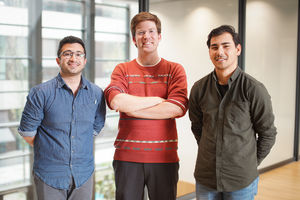PhD career Day Applied Sciences a success
On Tuesday 16 April the PhD council organised a brand new event: the PhD Career Day Applied Sciences. With more than 120 participants (20% of the PhD population of the Faculty of Applied Sciences), most of which are in their final year, it met the question of a lot of PhD candidates. In his introductory speech Kevin Felter, who organised the event together with Anthony Birnie and Hirad Daneshpour, encouraged everyone to get ready for the next step after graduation.
The PhD Career Day is an event organized by the PhD Council of the Faculty of Applied Sciences (AS) where young researchers and companies can meet and network. The aim is to provide an overview of non-academic career possibilities for PhD students as well as introducing companies to the talents at TU Delft. Alumni of more than 20 companies discussed questions of the participants in various speed date sessions.
A general introduction was given by Geertje Janssen of the recruiting company People in Science. With her overwhelming enthusiasm, she advised the listeners to not only observe but to actively participate during this day.
According to Geertje, many people apply for R&D scientist jobs in industry, while not that many jobs are available. Her advice is to explore different kind of job titles and look for jobs at small companies as well.
Another piece of advice by Geertje: “PhD’s are experts in their own field, but other non-technical skill and competences are also very important. Showcase the soft skills by giving examples of things you have done in this area.”
According to Geertje, networking is very important. You can’t skip this part. Around 80% of the people who have got a job, got that job through networking in some way.
During the speed dates with the various companies the following tip and tricks emerged:
- Make a good LinkedIn profile;
- Update your profile on the university website;
- Only 20 % of the recruiters really check your motivation letter, so take time to write a good CV;
- Don’t use colors for you CV/ they probably print it in black/ white;
- Put some personal information on your CV (these are also talking points for a possible interview);
- On average, recruiters read your CV for 8 seconds, and most of that time they spend reading about personal things, such as hobbies.
An overall conclusion of the day is that making a transfer from science to industry is very much possible, but that you need good preparation. Whether the shift has a big or small impact on the working life of the PhD candidate depends on the company, job title and work field.
